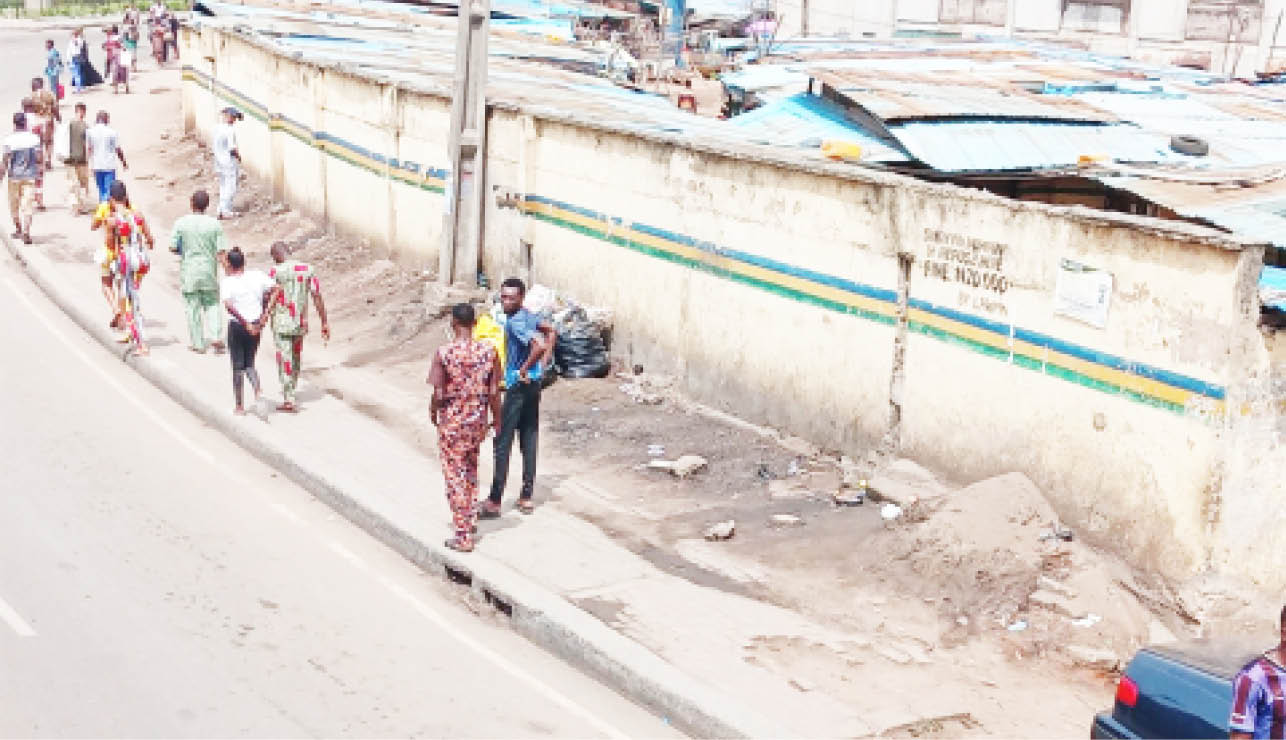With just three years away from the 2025 deadline, which Nigeria ought to be open defecation free, Lagos State is still battling the menace. Poor sanitation, open defecation and urination have continued to deface the city of Lagos amid efforts towards achieving a mega city status; thus, posing huge environmental and health burden on the people, Daily Trust Saturday reports.
In Lagos State, open defecation is a common feature in parts of the state, particularly on bridges, water channels, rail track, canals, gutters, open fields, and on lonely roads among others. Perpetrators of this act do not only hide under the cover of darkness to excrete; they also hide behind bushes, bridges, walls, shrubs among others to pass out faeces.
- Court remands Rivers pastor for defiling 8-year-old girl
- Lawmakers to use committee rooms, teleconferencing for plenary as NASS renovation begins
This unhygienic practice, which is gradually becoming a culture is being carried out in different parts of the state including Agege, top and under Ikeja bridge leading to Bolaji Bank Anthony Way, Ile-epo market area and bridge, Oshodi rail track and roadside, new garage Ojota, Makoko, Ejigbo, Orile, Mushin along rail track, Ketu, parts of Lagos-Ibadan expressway, Kara, Berger, Ajegunle, Idi-Araba, Obalende and other parts of the Island.
Also, areas that accommodate destitutes are prone to open defecation, urination as well as littering of the environment. All these practices do not befit a state with a mega city status.
Despite the signing of the Executive Order 009 titled ‘The Open Defecation-Free Nigeria by 2025 and Other Related Matters Order’ by President Muhammadu Buhari in November 2019, the age-old culture of open defecation has refused to go but persists even in urban areas.
In 2020, a task force on open defecation inaugurated on the directives of Governor Babajide Sanwo-Olu swung into action, arresting residents who were openly defecating in some parts of the state. During the raid, offenders were caught at Ilubirin, some on the Carter Bridge and others at Leventis by Marina, all in Lagos Island.
According to the United Nations Children’s Fund (UNICEF), about 46 million Nigerians defecate in the open and that another 56 million people are estimated to be added within the next ten years.

Findings by Daily Trust Saturday revealed that many traders in different markets across the state defecate in polythene bags or a four-litre paint bucket with cover, which they stuck under slabs along the roads while those who use bucket empty their faeces into nearby gutters, water channels or canals at the close of the day.
Daily Trust Saturday reporter once sighted a full-grown sane man defecating on the Ikeja bridge leading to Mobolaji Bank Anthony Way at about 9am. He was seen bending close to other dry excreta in the full glare of motorists who drove past him.
Aside from open defecation, another common practice is public urination, which takes place virtually everywhere and practiced by all classes of people residing in the state including elite, illiterates, male, female, young and old.
The guiltiest are the men (young and old) as they empty their bladders in the full glare of the public, at any time and anywhere with total disregard for the law against such practice. Commercial bus drivers and conductors while stuck in traffic normally alight to pass urine right on the tarred road by their buses, without considering that the smell of urine can be offensive.
Hoodlums, street urchins and people who are homeless and sleep in open places like under bridges, roadside, shops, markets etc are also guilty of this practice as they freely defecate and urinate anywhere they deem fit.
There are some areas known for high concentration of urine, characterised by very offensive smell in the state. An example of such places is under Ikeja bridge by the Police barrack fence, which has become a place people pass urine at any time of the day. It is so bad that passers-by would have to seize their breath while walking through the area.
Amidst this foul smell, business activities such as selling of food, water, soft drinks, sachet alcoholic drinks, nose masks and loading of passengers in vehicles going to Maryland, Yaba, Ojuelegba among others take place with disregard for the offensive smell.
While some have blamed the retention of this unhygienic practice on poverty, ignorance, and lack of adequate public toilet facilities; Daily Trust reports that open defecation prevails even in areas where these facilities are available.
A make-up artist in Shasha area of Lagos, Agatha, said that open urination is mostly common among the male folks, because they find it easier to bring out their genitals to ease themselves than the female folks. “The worst part is seeing a well-dressed educated man, bringing out his manhood to urinate openly in front of people. This is really disgusting! You can’t walk past some corners without perceiving the offensive smell of urine.”

In Makoko, Mama Aliya who sells fish told Daily Trust Saturday that those of them who reside on water do not have proper toilet facilities as they defecate and urinate directly into the water and still bathe there.
A resident of Lekki, who simply gave his name as Olawale, said that open urination and defecation is rampant because there are no sufficient public toilets for people to use when pressed. He said, “It is not healthy to hold urine for too long. Sometimes, it doesn’t come in a conducive environment and most times because of the pressure, you just want to do it anywhere to get some relief. On the Island for instance, public toilets are not many, as such, people will be forced to use any available gutter, corner, water channel etc.”
Mr. Gabriel Juwon added that from Berger to First Gate at Agidingbi, there is only one public toilet, which is the one at Berger.
He further suggested that eateries, filling stations, banks, churches and mosques among others be compelled by law to keep their toilets neat and make them available to members of the public, in order to check this ugly trend.
Miss Jacinta Barisi also emphasized the need for the government to enforce a law that will restrict people from engaging in unhygienic practices.
Poor Maintenance of public toilet
A visit by Daily Trust Saturday reporter to some of the public toilets showed that they charge N50 for urinating and N100 for defecating. It was observed at one of the privately owned toilets along Oshodi Road that unavailability of constant water supply is a challenge, and as such, operators measure water given to users per time. The quantity according to some users is too small and usually not enough to wash themselves and also flush.
It was also observed that some of the public toilets do not provide hand wash or soap for users to wash their hands after using the toilets. Similarly, some of the mobile toilets sighted along the Oshodi Road do not appear clean even from the outside. These factors and more constitute reasons why people don’t patronise them.
Mrs Rasheedat Lawal, a trader at Mushin market, said she doesn’t use public toilets due to fear of contracting toilet infection as many of the facilities are not well cleaned and disinfected by the operators. She said, “That a water closet appears white does not mean it is clean. There is a need to regularly disinfect the WC.”

Implications to human health, environment
A Public Health Physician in Lagos, Dr. Ogunyemi Riyike, while commenting on the implication of defecating in the open, said it will increase water borne diseases such as typhoid, cholera, diarrhoea among others.
She further revealed that open defecation also causes an increase in vector borne diseases because when people defecate in the open, it will attract flies, insects, which could eventually get into homes and perch on foods or drinks.
She noted that open defecation could increase gender-based violence as women or girls who reside in places where there is no toilet could be exposed to sexual abuse in places where they go to pass faeces or urine in the early hours of the day or late at night.
Dr. Ogunyemi also stressed that open defecation causes an increase in toxins and bacteria into the ecosystem, as bacteria activities increase toxins, which can lead to proliferation of microbes and can cause a lot of harm.
Solution to the problem, she said, is not a one-sided approach but multi-faceted as both individuals and government have roles to play. She stressed the need for provision of adequate public toilets. However, she noted that because of poverty, it might be difficult for people in the slums to have proper toilets but the government must look into those areas with a view to providing the facilities, creating awareness about them and sensitizing the people on the dangers of open defecation.
She urged the government to provide public toilets in market places, town halls, business areas etc.
Is the smell of urine harmful to human health?
Dr. Ogunyemi admitted that the smell of urine is very offensive, as no one finds it palatable or inviting.
“A brief moment of inhaling does not really cause any harm, as such, to the system but if you are in a place where there is a high concentration of urine (the amino content), you could have irritation of the throat, nose, eyes, depending on how concentrated the urine in that area is and how long you are stuck in the area. The major issue however, has to do with the offensive smell,” she explained.
An environmental and human promoter, Mr. Olushola Adekoya, also stressed the need for the state government to provide toilet facilities within every 2 kilometres; create massive awareness about the existence of the facilities as well as educate the people on why they must use the facilities.
An engineer, Mr. Victor Adeyi, emphasized the need for the government to ensure availability and adequate supply of water in all communities across the state.
To commemorate the 2021 World Toilet Day, a toilet cleaning brand, Harpic, manufactured by Reckitt donated toilets to Lagos communities. The newly refurbished public toilets donated are located in Lagos Island, Mushin, Bariga/Iyana Oworo, Iyana Ipaja and Iyana Isolo within Lagos State.
Marketing Director Reckitt Sub Saharan Africa, Mr. Tanzim Rezwanne, mentioned that the toilet refurbishment and product donation by Harpic was in line with the brand’s purpose to help Nigerians get access to hygienically clean toilets.

 Join Daily Trust WhatsApp Community For Quick Access To News and Happenings Around You.
Join Daily Trust WhatsApp Community For Quick Access To News and Happenings Around You.
